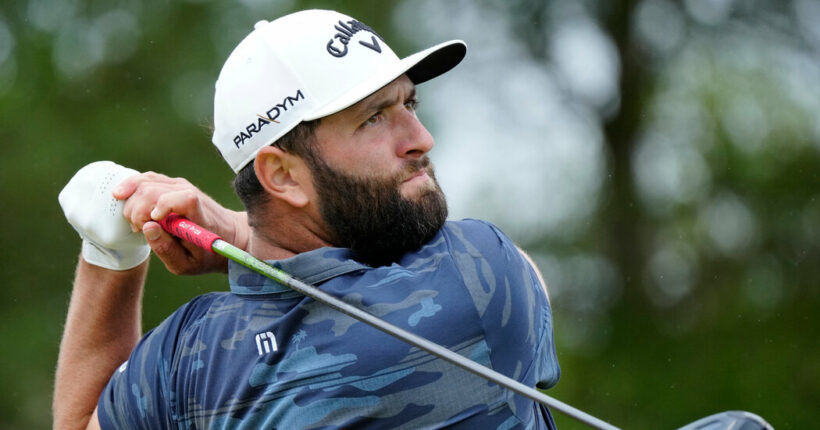Every major tournament has the cruel, curt power to humble golf’s stars. Rory McIlroy at the Masters. Justin Thomas at the P.G.A. Championship. Phil Mickelson at the U.S. Open (OK, make that a lot of them).
This British Open was seeming awful vengeful, more hostile and taunting to the sport’s powers than most recent majors — until Jon Rahm mounted the sort of Saturday stampede that propels a player into the record books and closer to contention.
The world’s third-ranked player had stumbled to a three-over-par 74 on Thursday at Royal Liverpool Golf Club, good for all of 89th place. A 70 on Friday moved him 50 places forward. He arrived at the course a dozen shots off Brian Harman’s lead. But when Rahm finished his Saturday round with a birdie, just after Harman made a solitary, silent walk to the first tee to begin his, the gap between the men, one a two-time major winner, the other an also-ran, was down to four.
Before nightfall on England’s western coast, where downpours and winds were sporadic menaces on Saturday, Harman had pushed his margin over Rahm up to six, edging him toward hoisting the freshly engraved claret jug on Sunday evening. Cameron Young was nearest to Harman, five strokes back.
But Rahm’s Saturday 63 was, by two shots, a record for an Open at Royal Liverpool, which is hosting the tournament for the 13th time. It was also a forceful answer to two days of largely ho-hum play by many of the world’s marquee golfers at the Open, where the leaderboard had often felt like a glimpse into the game’s depths.
“I gave up the shots at major championships that are very costly, and that’s mainly it,” Rahm said on Saturday. “That’s what I was feeling. I knew I was playing better, and I knew my swing and my game felt better than the scores I was shooting.”
Saturday, a feast for imaginative shotmaking, was different.
Often, Rahm noted, the world’s best visualize what they would like to happen with this shot or that one. Often, he noted, reality intrudes. But his Saturday, he suggested, had been marked by the feeling of seeing “everything the way it’s supposed to happen unfold.” On Saturday, he said at one point in Spanish, he had “felt invincible.”
He made his day’s debut birdie on the fifth hole, and added another on the ninth. Another came on the 10th, and it was around then, he recalled later, that his shots started hurtling downwind. He picked up more birdies on the 11th and 12th holes, two more at Nos. 15 and 16 and the last on the 18th, the crowd worked into a thunder.
Until Rahm’s Saturday surge, disappointment had been running close to endemic among the sport’s top players, not because many stars would not win but because they would not even come close.
The first five pairings on Saturday — the players who came nearest to missing the cut — included Scottie Scheffler (the current world No. 1), a five-time major champion (Brooks Koepka) and one of the game’s most chronically popular figures (Rickie Fowler).
The last five pairings on Saturday? The players most clearly positioned to contend? Koepka alone had more major titles than the entirety of the group, which entered Saturday with an average world ranking of 59th, 40 spots lower than the mean for last summer’s third round at St. Andrews.
The top of the leaderboard was soon speckled with headliners, and headliners-in-waiting. Young, who finished second at last year’s Open, finished at seven under, a stroke ahead of Rahm. Jason Day, a former world No. 1, Tommy Fleetwood and Viktor Hovland were among the players at five under. McIlroy, currently ranked second in the world, put together a 69 to go to three under.
But it has still been a weird week, after a Friday cut that knocked out a head-turning array of recent major champions, including Mickelson, Dustin Johnson, Collin Morikawa and Justin Thomas. Other top-tier players, including Scheffler, Koepka, Fowler and Patrick Cantlay, barely got to stay for the weekend.
“Maybe everyone is just not quite on their stuff this week,” said Cameron Smith, the winner of last year’s Open, who brought his score to one under on Saturday when he shot a 68. “I’m not really sure of the answer there. But those bunkers, I think if you’re trying to be aggressive — and generally major winners are aggressive players — it can bite you in the bum.”
All many players could do was look to get through Sunday.
“Win?” said Scheffler, who would be 16 strokes off the lead at the end of the third round.
“A hurricane and then some I think is what it’s going to take for me,” he added on one of the few major Saturdays where he was done before the leaders even stepped up to the first tee. “I’m just going to go out tomorrow and do my best and move my way up the leaderboard and try and have a good day.”
Robert MacIntyre, the runner-up at last weekend’s Scottish Open, was similarly resigned. On Saturday afternoon, his mind was already wandering toward the hours after the tournament.
“Know that you’ve got 18 holes before you put your feet up,” he said.
Rahm, revived, was in a far different place.
“I’ve done what I’ve needed,” he said, “which is give myself an opportunity.”
Alan Blinder is a sports reporter. He has reported from more than 30 states, as well as Asia and Europe, since he joined The Times in 2013. More about Alan Blinder
Source: Read Full Article
